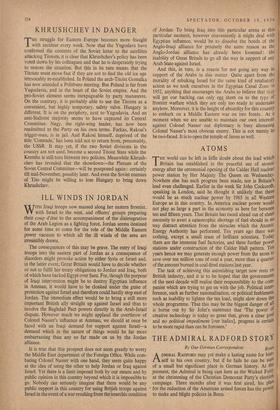ILL WINDS IN JORDAN
WITH Iraqi troops now massed along her eastern frontier, with Israel to the west, and officers' groups preparing their coup d'etat to the accompaniment of the disintegration of the Arab Legion as a fighting force, Jordan seems destined for some time to come for the role of the Middle Eastern power vacuum to which all the ill winds of the area are irresistibly drawn.
The consequences of this may be grave. The entry of Iraqi troops into the eastern part of Jordan as a consequence of disorders might provoke action by either Syria or Israel and, in the latter event, Great Britain would have to decide whether or not to fulfil her treaty obligations to Jordan and Iraq, both of which have backed Egypt over Suez. For, though the purpose of Iraqi intervention might be to destroy Egyptian influence in Amman, it would have to be cloaked under the guise of protection against Israel and therefore could hardly stop east of Jordan. The immediate effect would be to bring a still more important British ally straight up against Israel and thus to involve the Baghdad Pact powers directly in the Arab-Israel dispute. However much we might applaud the overthrow of Colonel Nasser's influence at Amman, we should at once be faced with an Iraqi demand for support against Israel—a demand which in the nature of things wotild be far more embarrassing than any so far made on us by the Jordan alliance.
It is true that this prospect does not seem greatly to worry the Middle East department of the Foreign Office. While com- bating Colonel Nasser with one hand, they seem quite happy at the idea of using the other to help Jordan or Iraq against Israel. Yet there is a limit imposed both by our means and by public opinion in this country beyond which it is impossible to go. Nobody can seriously imagine that there would be any public support in this country for using British troops against Israel in the event of a war resulting from the anarchic condition of Jordan. To bring Iraq into this particular arena at this particular moment, however conveniently it might deal with Egyptian influence, would be to dissolve the bonds of the Anglo-Iraqi alliance for precisely the same reason as the Anglo-Jordan alliance has already been loosened : the inability of Great Britain to go all the way in support of any Arab State against Israel.
And this, in turn, is a reason for not going any way ill support of the Arabs in this matter. Quite apart from the morality of rebuking Israel for the same kind of retaliatory action as we took ourselves in the Egyptian Canal Zone in 1952, anything that encourages the Arabs to believe that tilzy will get our backing can only egg them on to the type of frontier warfare which they are only too ready to undertake anyhow. Moreover, it is the height of absurdity for this country to embark on a Middle Eastern war on two fronts. At a moment when we are unable to maintain our own interests against Colonel Nasser our diplomacy is busy alienating Colonel Nasser's most obvious enemy. This is not merely to be two-faced. It is to open the temple of Janus as well.


































 Previous page
Previous page